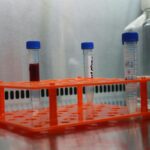High B12 Levels Causes: Should You Be Worried?
Healthy’s Summary
If you’ve ever had blood work done and noticed high B12 levels, you’re probably thinking: “Wait, isn’t more B12 a good thing?” Not always. While low B12 can cause fatigue and brain fog, excess B12 levels might raise other red flags, or signal something deeper going on.
The keyword here is why. Because your body doesn’t actually “make” too much B12 on its own. So if your levels are unusually high, it could be due to supplements, certain health conditions, or changes in how your body processes vitamins.
In this article, we’ll unpack the top high B12 levels causes, how to interpret your lab results, and what to ask your provider if something looks off. Spoiler: It’s not always about what you’re eating.
Why Are My B12 Levels So High If I Don’t Take Supplements?
Here’s the thing: your body is pretty good at regulating B12. It’s a water-soluble vitamin, which means your kidneys should filter out what you don’t need. So if your B12 levels are higher than normal and you’re not actively supplementing, it’s worth digging into what else might be happening. Some common high b12 levels causes include:
- Liver issues: The liver stores B12, so conditions like hepatitis or fatty liver disease can release excess B12 into your blood.
- Kidney problems: When kidneys aren’t working well, B12 might not be properly excreted.
- Blood disorders: Certain types of leukemia, lymphoma, or polycythemia vera (a rare blood cancer) can push B12 levels up.
- Cell turnover: High rates of cell death or regeneration (seen in some inflammatory diseases) can increase B12-binding proteins, falsely raising levels.
According to a 2014 study, elevated B12 was associated with increased mortality risk in some hospital patients—but that doesn’t mean B12 itself was the problem. It was a signal something else was off.
Bottom line: High B12 might not be dangerous on its own—but it often points to something else your body is trying to tell you.
Can Too Many Supplements Cause High B12 Levels?
Short answer? Yes. And it happens more often than you might think.
People often assume B12 is harmless because it’s water-soluble. While it’s true you’ll usually pee out the excess, very high doses—especially from injections or megadose pills—can still cause B12 to spike on labs.
Here’s what to watch for:
- Multivitamins and energy shots: Some have B12 levels far above the daily recommended amount (like, thousands of percent higher).
- B12 injections: Used for deficiencies or fatigue, these can keep blood levels artificially high for weeks.
- Fortified foods: Energy drinks, cereals, and plant-based milks may contain added B12, which adds up over time.
According to the NIH Office of Dietary Supplements, no upper intake level has been set for B12 because toxicity is rare—but again, high blood levels without a clear reason may point to something beyond intake alone.
Ask Healthy
What Symptoms (If Any) Come with High B12?
This part’s tricky. Most people with high B12 levels don’t feel anything at all. It’s often picked up incidentally during routine lab work.
But in some cases, elevated B12 can accompany symptoms tied to the underlying cause—not the B12 itself. These might include:
- Unexplained fatigue or weakness
- Jaundice or changes in liver function
- Itchy or flushed skin (with very high levels)
- Digestive issues or loss of appetite
Important note: if you’re being treated for B12 deficiency, your levels may stay high for a while as your body rebuilds stores. That’s normal and not usually a cause for concern.
But if you’re not supplementing—and your levels keep climbing—it’s worth a second look. Develop some questions for your doctor by reading our other article: Could High B12 Levels Be a Sign of Cancer? Here’s What You Should Know
The Takeaway
Your body doesn’t just “make” too much B12 for fun. So if your bloodwork shows high B12 levels, the real question is: why?
Sometimes it’s as simple as over-supplementation. Other times, it’s your body waving a red flag about something deeper—like liver, kidney, or blood issues.
Either way, it’s not something to ignore. Talk to your provider, share any symptoms you’re feeling, and ask whether additional tests might help clarify what’s going on behind the scenes.
Want to dig deeper?
You’re Not Crazy! Find Answers to What’s Causing Your Symptoms
Struggling to connect the dots between your symptoms and potential causes? This program empowers you to track symptoms, diet, and mood, uncovering patterns and triggers for hard-to-diagnose conditions like gut health, IBS, migraines, autoimmune diseases, and chronic fatigue. Gain clarity and create doctor-ready reports with tools designed to support your self-advocacy and health journey.
Enroll in one of Healthy’s Programs to log, track and learn more about your Health, one conversation at a time.
Learn More




